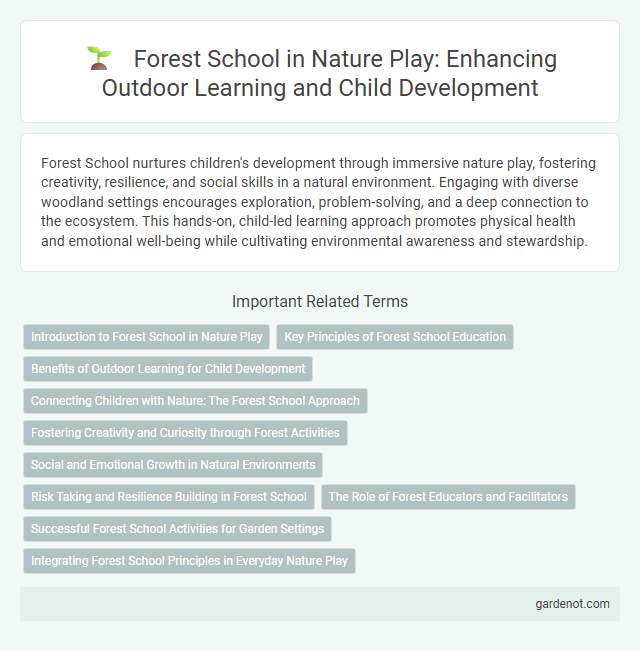Forest School nurtures children's development through immersive nature play, fostering creativity, resilience, and social skills in a natural environment. Engaging with diverse woodland settings encourages exploration, problem-solving, and a deep connection to the ecosystem. This hands-on, child-led learning approach promotes physical health and emotional well-being while cultivating environmental awareness and stewardship.
Introduction to Forest School in Nature Play
Forest School is an outdoor education approach that emphasizes child-led learning in natural environments, fostering creativity, resilience, and social skills through hands-on experiences. Rooted in Scandinavian educational principles, it encourages exploration, risk-taking, and connection with nature, promoting physical and emotional development. Integrating Forest School methods into nature play enhances cognitive growth and environmental stewardship by immersing children in diverse ecosystems.
Key Principles of Forest School Education
Forest School education emphasizes learner-led exploration, fostering curiosity, creativity, and resilience through direct interaction with natural environments. Its key principles include holistic development, risk-taking in a safe setting, and consistent opportunities for children to develop confidence and self-esteem. This approach integrates outdoor learning with emotional and social growth, promoting sustainable relationships with nature.
Benefits of Outdoor Learning for Child Development
Forest School programs enhance child development by fostering emotional resilience, social skills, and environmental awareness through immersive outdoor learning experiences. Exposure to natural settings stimulates cognitive growth, creativity, and problem-solving abilities while promoting physical health and motor skills. Regular engagement in nature-based activities supports holistic development and nurtures a lifelong connection to the environment.
Connecting Children with Nature: The Forest School Approach
Forest School programs immerse children in natural environments, fostering emotional resilience, creativity, and environmental stewardship. By engaging in hands-on activities like building shelters, wildlife observation, and sensory exploration, children develop a deep, meaningful connection to nature. This approach supports holistic development and encourages lifelong appreciation for the outdoors.
Fostering Creativity and Curiosity through Forest Activities
Forest School nurtures creativity and curiosity by engaging children in immersive, hands-on experiences within natural environments. Activities such as exploring diverse flora, building shelters, and observing wildlife stimulate imaginative thinking and problem-solving skills. This approach promotes cognitive development and a lifelong passion for learning rooted in direct interaction with nature.
Social and Emotional Growth in Natural Environments
Forest School programs foster social and emotional growth by encouraging children to develop self-confidence, resilience, and cooperation through immersive, unstructured play in natural environments. Interaction with diverse natural settings enhances emotional regulation and empathy as children navigate challenges and build relationships. These outdoor experiences promote holistic development, supporting mental well-being and stronger social skills in a supportive, nature-based community.
Risk Taking and Resilience Building in Forest School
Forest School encourages children to engage with natural environments, fostering risk-taking behaviors that are essential for building resilience and confidence. Through guided exploration of uneven terrain, climbing trees, and managing minor hazards, participants develop problem-solving skills and emotional strength. This experiential learning approach promotes physical stamina, adaptability, and a growth mindset critical for lifelong well-being.
The Role of Forest Educators and Facilitators
Forest educators and facilitators play a crucial role in guiding children's exploration and learning within natural environments, fostering emotional resilience and environmental stewardship through hands-on, experiential activities. Their expertise in creating safe, inclusive spaces encourages curiosity, risk-taking, and social collaboration, which are essential components of effective forest school programs. By modeling respect for nature and supporting personalized learning journeys, these professionals deepen children's connection to the environment and promote long-term sustainable behaviors.
Successful Forest School Activities for Garden Settings
Successful Forest School activities for garden settings include sensory exploration, where children engage with natural materials like leaves, bark, and soil to stimulate tactile and olfactory senses, fostering a deep connection with nature. Creative play involving loose parts such as sticks, stones, and pinecones encourages problem-solving and imaginative thinking, promoting cognitive development. Planting native species and observing seasonal changes teach ecological awareness and responsibility, reinforcing the principles of sustainability within a manageable outdoor environment.
Integrating Forest School Principles in Everyday Nature Play
Integrating Forest School principles in everyday nature play fosters child-led exploration, encouraging curiosity and resilience through hands-on interaction with natural environments. Emphasizing risk-taking, sensory experiences, and connection to biodiversity enhances cognitive and emotional development in outdoor settings. Consistent exposure to natural elements such as trees, soil, and wildlife supports environmental stewardship and holistic learning outcomes.
Forest School Infographic

 gardenot.com
gardenot.com